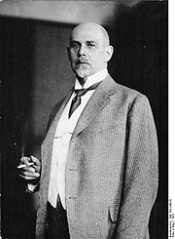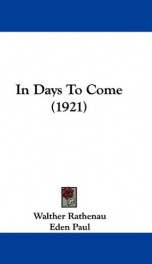Rathenau Walther

Walther Rathenau (September 29, 1867 – assassinated June 24, 1922) was a German industrialist, politician, writer, and statesman who served as Foreign Minister of Germany during the Weimar Republic. Rathenau was born in Berlin, the son of a daughter of Benjamin Liebermann and Emil Rathenau, a prominent Jewish businessman and founder of the Allgemeine Elektrizitäts-Gesellschaft (AEG), an electrical-engineering company. He studied physics, chemistry, and philosophy in Berlin and Strasbourg. His German Jewish heritage and his wealth [1] were both factors in establishing his deeply divisive reputation in German politics, at a time of anti-Semitism. He worked as an engineer before joining the AEG board in 1899, becoming a leading industrialist in the late German Empire and early Weimar Republic periods.[2] Rathenau is thought to be the basis for the German industrialist character "Arnheim" in Robert Musil's novel The Man Without Qualities. A strong German nationalist,[3] Rathenau was a leading proponent of a policy of assimilation for German Jews: he argued that Jews should oppose both Zionism and socialism and fully integrate themselves into mainstream German society. This, he said, would lead to the eventual disappearance of anti-Semitism. As a powerful, affluent and highly visible German Jewish politician, Rathenau was hated by Germany's extreme right, despite himself being a German nationalist, culminating in his 1922 assassination. During World War I Rathenau held senior posts in the Raw Materials Department of the War Ministry, while becoming chairman of AEG upon his father's death in 1915. He played a leading role in putting Germany's economy on a war footing, enabling wartime Germany to continue its war effort for years despite the serious shortages of labor and raw materials that were caused by an ever-tightening naval blockade. Rathenau was a moderate liberal in politics, and after World War I he was one of the founders of the German Democratic Party (DDP). He rejected the tide of socialist thought which swept Germany after the shock of defeat and revolution, opposing state ownership of industry and advocating greater worker participation in the management of companies. His ideas were influential in post-war governments. In 1921, Rathenau was appointed Minister of Reconstruction, and in 1922 he became Foreign Minister. His insistence that Germany should fulfill its obligations under the Treaty of Versailles, while working for a revision of its terms, infuriated extreme German nationalists. He also angered such extremists by negotiating the Treaty of Rapallo, 1922 with the Soviet Union, although the treaty implicitly recognized secret German-Soviet collaboration, begun in 1921, which provided for the rearmament of Germany, including German aircraft manufacturing, inside the Soviet union.[4] The leaders of the (still obscure) Nazi Party and other extreme right-wing groups falsely claimed he was part of a "Jewish-Communist conspiracy", despite his being a liberal German nationalist who had himself bolstered the country's then recent war effort. The British politician Robert Boothby wrote of him: "He was something that only a German Jew could simultaneously be: a prophet, a philosopher, a mystic, a writer, a statesman, an industrial magnate of the highest and greatest order, and the pioneer of what has become known as 'industrial rationalization'." In fact, despite his desire for economic and political co-operation between Germany and the Soviet Union, Rathenau remained skeptical of the methods of the Soviets. In his Kritik der dreifachen Revolution (Critique of the triple revolution) he noted that: We cannot use Russia's methods, as they only and at best prove that the economy of an agrarian nation can be leveled to the ground; Russia's thoughts are not our thoughts. They are, as it is in the spirit of the Russian city intelligentsia, unphilosophical, and highly dialectic; they are passionate logic based on unverified suppositions. They assume that a single good, the destruction of the capitalist class, weighs more than all other goods, and that poverty, dictatorship, terror and the fall of civilization must be accepted to secure this one good. If ten million people must die to free ten million people from the bourgeoisie, then this is a harsh but necessary consequence. The Russian idea is compulsory happiness, in the same sense and with the same logic as the compulsory introduction of Christianity and the Inquisition. On June 24, 1922, two months after the signing of the Treaty of Rapallo, 1922, Rathenau was assassinated in a plot led by two ultra-nationalist army officers (aided and abetted by others) linked to Organisation Consul: Erwin Kern, murderer of Walther Rathenau, and Hermann Fischer.[5] On that morning, he was driving from his house to Wilhelmstraße, as he did daily (and predictably). During the trip his car was passed by another in which three armed men were sitting. They simultaneously shot at the minister with machine guns, threw a hand grenade into the car before quickly driving away. A memorial stone in the Koenigsallee in Berlin-Grunewald marks the scene of the crime. Rathenau was fervently mourned in Germany, with flags officially at half mast, although this was not compulsory. After the Nazis came to power in 1933, they declared Rathenau's assassins as national heroes and designated June 24 as a holiday of celebration. One of the assassins was the future writer Ernst von Salomon, who had provided the car but was not present at the shooting. Two of the other assassins, Erwin Kern and Hermann Fischer, committed suicide when surrounded by the police in the turret of Saaleck castle, near Koesen. The final assassin, Ernst Werner Techow, who drove the car, was captured and sentenced to 15 years in prison. At his trial he claimed that he had acted under duress, as Kern threatened to kill him when he tried to withdraw from the murder plot.[6] Upon his release from prison for good behavior in 1927, he volunteered for the French Foreign Legion. During the Second World War he helped save hundreds of Jews in Marseilles, apparently as an attempt at penance for his crime.[7] Some believe that Rathenau's assassination may have significantly influenced the long-term political, economic, and social development of Europe (or was the result of such development, particularly the development of leftward-trending parties, class consciousness, nationalistic feelings, and antisemitism). It was certainly an early sign of the instability and violence which were eventually to permeate and destroy the Weimar Republic. The British writer Morgan Philips Price wrote: In June 1922 Walter Rathenau, a big Jewish industrialist and progressive economist, was assassinated by gangsters of the extreme Right who were the heart and soul of the Freikorps. I was present at the memorial service in the Reichstag and noted an extraordinary outburst of enthusiasm among the workers of Berlin, as expressed in their trade union leaders and socialist parties, for the Republic and for President Ebert. The rank and file of the Majority Social Democrats were now thoroughly aroused...first Communists, then Socialists, and now a big industrialist were murdered for having Liberal views and, in the last case, for being a Jew. The situation in Germany was becoming more and more sinister. Others, such as historian Erich Eyck, argue that the murder of Rathenau may have been the singular event that set into motion the period of extreme hyperinflation in Germany during 1922–23: But as great as was the impact of Rathenau’s death upon German domestic politics, it left an even greater mark upon the economic scene. Now the tumble of the mark could not be stopped. The dollar, still under 350 on the day of the murder, climbed to 670 by the end of July, to 2000 in August, and to 4500 by the end of October.[8] Albert Einstein later commented that he was "greatly disturbed" by Rathenau's assassination, since he saw it as early proof of an immense anti-pacifist and anti-semitic presence in Germany.[9] (Editor), Hilary Von Strandmann, (Translator), Von Strandman . ISBN: 0198225067 , ISBN-13:978-019822-5065. (October 1985). Clarendon Press, 528 pages, in English , (Hardcover - ISBN 31101985).
do you like this author?
What readers are saying
What do you think? Write your own comment on this book!
write a commentWhat readers are saying
What do you think? Write your own comment on this author!
write a commentBook list

Où va le monde?
Considérations philosophiques sur l'organisation sociale de demain
Series:
Unknown
Year:
Unknown
Raiting:
4/5
Show more
add to favoritesadd In favorites

Cannes und Genua
Vier Reden zum Reparationsproblem
Series:
Unknown
Year:
Unknown
Raiting:
4.5/5
Show more
add to favoritesadd In favorites
Book list

Où va le monde?
Considérations philosophiques sur l'organisation sociale de demain
Series:
Unknown
Year:
Unknown
Raiting:
4/5
Show more
add to favoritesadd In favorites

Cannes und Genua
Vier Reden zum Reparationsproblem
Series:
Unknown
Year:
Unknown
Raiting:
4.5/5
Show more
add to favoritesadd In favorites

The New Society
Series:
Unknown
Year:
Unknown
Raiting:
5/5
Authorized Translation by Arthur Windham --This text refers to an alternate Paperback edition.
Show more
add to favoritesadd In favorites
What readers are saying
What do you think? Write your own comment on this author!
write a commentif you like Rathenau Walther try:
readers also enjoyed
What readers are saying
What do you think? Write your own comment on this author!
write a commentGenre
if you like Rathenau Walther try:
readers also enjoyed
Do you want to read a book that interests you? It’s EASY!
Create an account and send a request for reading to other users on the Webpage of the book!


